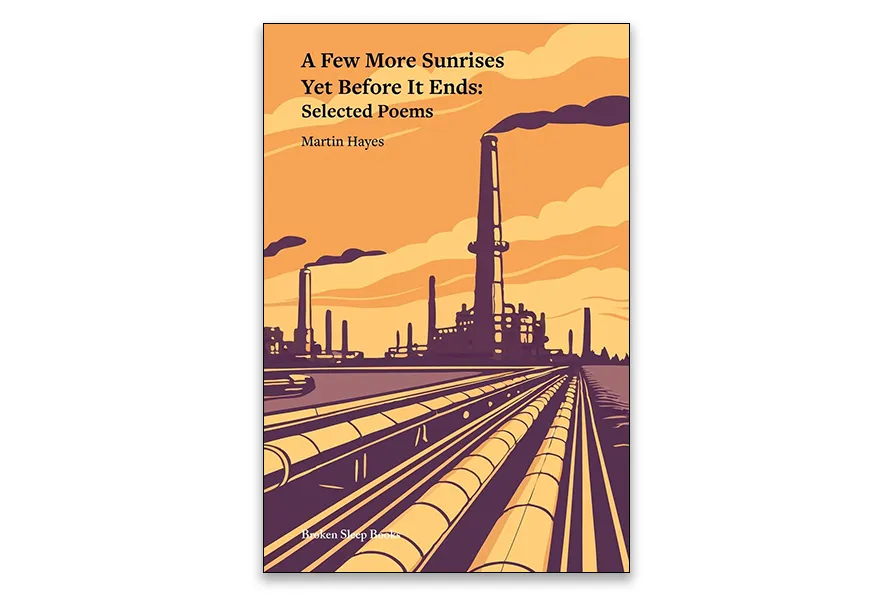RITA DI SANTO draws attention to a new film that features Ken Loach and Jeremy Corbyn, and their personal experience of media misrepresentation
Error message
An error occurred while searching, try again later.ALAN MORRISON introduces a UK poet whose despised daytime occupation provides the subject for his writing


A Few More Sunrises Yet Before It Ends: Selected Poems
Martin Hayes, Broken Sleep Books, £18.99
A FEW MORE SUNRISES YET BEFORE IT ENDS comprises selections from five of Martin Hayes’ previous poetry collections: When We Were Almost Like Men (2015), The Things Our Hands Once Stood For (2016), Roar! (2018), Ox (2021), Underneath (2021), and Machine Poems (2024).
For anyone familiar with the oeuvre of US blue-collar poet Fred Voss (1952-2025), his rangy-lined free verse depictions of manual factory work have served as something of a template for the unpunctuated expansions of Hayes’ poems, almost all of which are based around his place of work, a courier firm in London.
But while Hayes might be seen as Britain’s answer to Voss (he too shares a tendency for long Whitmanesque poem titles) he has, through the course of several volumes, stamped his own signature on the underrepresented poetry of employment.
One key difference from Voss is that Hayes depicts his experiences in the courier industry where he works as a computer-clamped “controller” (an ironically titled position given the poet’s sense of powerlessness), more white-collar than blue-collar work, though arguably much more precarious.
As Andy Croft notes in his foreword, the corporate sweatshop of Phoenix Express is a computerised contemporary replacement for the exploitative painting and decorating firm Rushton & Co in Tressell’s The Ragged Trousered Philanthropists (1914).
In Ox, the poem Ox And The Great Big Identity Trick echoes the key Marxian concept of “The Great Money Trick” as presented by the Tressell’s main protagonist, socialist sign-writer Frank Owen, who fruitlessly tries to awaken a class consciousness among his complacent, tabloid-sated workmates. Thematically there are also echoes of Jack London’s semi-autobiographical blue-collar Bildunsgroman, Martin Eden (1909).
Croft touches on other similarly placed poets in his foreword: “In the first half of the 20th century a number of self-taught working-class poets emerged from the urban proletariat to write about their part in the productive labour-force — notably Joe Corrie (the Fife coalfield), Ethel Holdsworth (Lancashire cotton-mills), Julius Lipton (East End sweatshops) and Fred Boden (the Derbyshire coalfield).” This proletarian tradition in literature stretches back to the 18th and 19th centuries, much of which mushroomed from the Chartist movement.
Amid the casual language there are increasingly more figurative seams apparent as we travel forwards through Hayes’ collections: “his fingers began to dance over his keypad like dragonflies” (from More Magical And Beautiful Than Any Machine); “spinning around while dragging deep down on their cigarettes/ before throwing back their heads/ and laughing that smoke out of their mouths” (from Our Serengetis). In the poem Work comes a crowning epitaph: “there is no respite from it// it is the only thing that pays the rent/ the food the electricity the toothpaste/ the plasters Bonjela codeine and wine” — the opiums of employment.
Hayes’ poetry fits the proletarian tradition in that it is almost entirely shaped by and concerned with the poet’s paid occupation. And, paradoxically, it is this despised daytime occupation that provides succour for his more authentic spare-time occupation as poet, since it gives him his subject. There are some other contemporary poets who write about employment, one being Paul Tanner (Shop talk: Poems for Shop Workers, Penniless Press, 2019) who is also author of the Morning Star’s Minimum Rage cartoon strip, but they are exceptions.
The candid content of Hayes’ work, particularly his collection Roar!, prompted his employer to threaten him with the sack, which is largely why Hayes began to use more symbolic imagery from the metonymic Ox onwards.
Who says capitalism can’t sometimes feel threatened by poetry?










